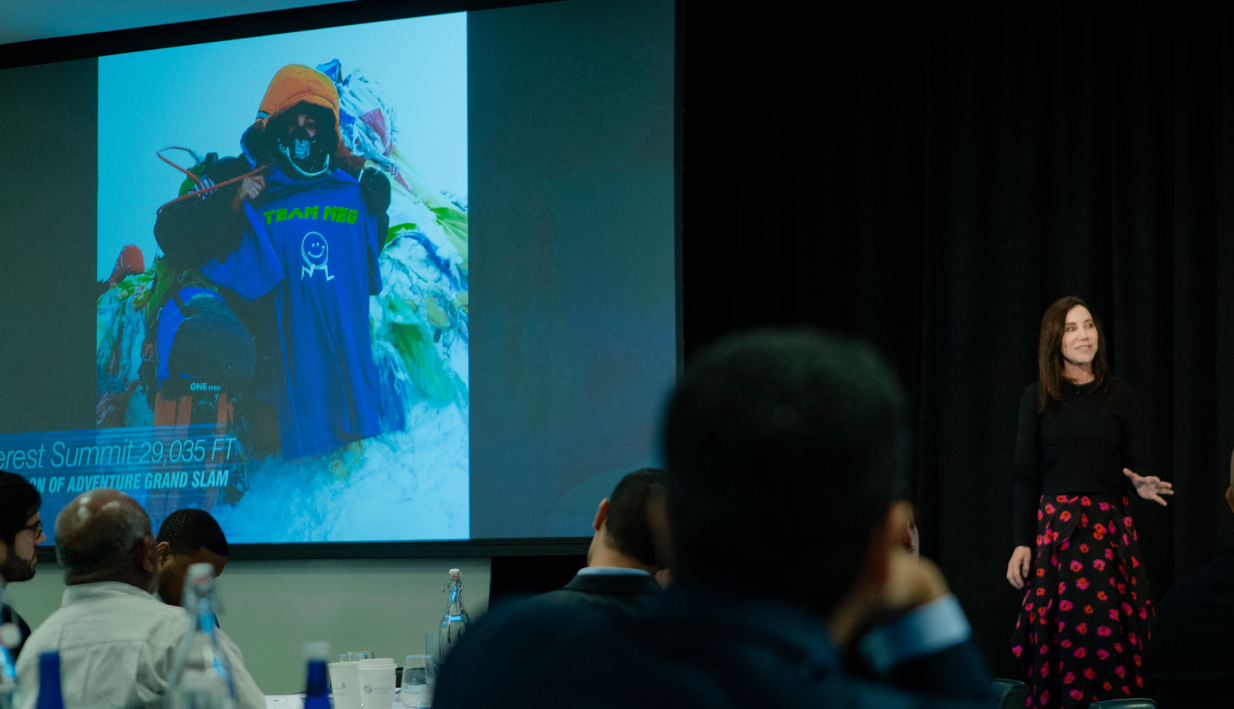What is your Mount Everest? That’s the question that was posed to us during Alison Levine's keynote at a recent Edison event. For Alison, a mountaineer and polar explorer (among many other things), Everest WAS her Everest – twice. For many of us who spend most of our time in offices and conferences rooms, the question isn't quite as literal. Many would say that their Everest is launching and scaling their business. Given the diverse backgrounds and varying experiences in the room – for some this was their first ascent, others had summit-ed many times over and were gearing up for another venture, and some were mid-climb in the face of serious adversity from competitors, market pressures, or consumer demands.
As Alison recounted her two ascents of Everest, some critical lessons began to form. While we all face adversity in the business world, it's not uncommon for those teachings/learnings to get muddled by office politics, endless meetings and repetitive PowerPoint decks. In true life-and-death adversity, as Alison experienced, those lessons crystallize and become much more visible - vital to survival in any situation. Three lessons stood out to us that ultimately can be applied in growing and managing a business:
Lesson #1: You can’t control everything
As Alison mentioned, “Everest is a bad place for control freaks.” On the mountain, anything can change in the matter of minutes – a bluebird day can quickly turn into a nightmare with blizzard conditions and gale-force winds. But storms are temporary and its essential to keep your bearings. While you may try to have a contingency plan for every situation you think you might face, the truth is the unexpected happens often and plans are outdated as soon as they are created. In those scenario it is best to accept the current situation as reality - to focus on what is going around you and execute based on that.
Lesson #2: Backing up is not the same as backing down
On Everest you spend weeks ascending and descending from base camp to camps 1, 2 and 3. This is an effort to acclimatize your body to the conditions – otherwise if you tried to do it in a straight shot, you would be dead in a matter of days, if not hours. You can imagine how physically and mentally exhausting it is going up, just to go right back down. Progress is generally thought of as one way – if you’re not going up then you’re failing. However, if you zoom out and look at the bigger picture, that of course is not the case. In business, pivoting, having a false start on a product launch, or regrouping to reassess path to market all somewhat have a negative connotation to them. The truth is they are necessary – in many cases, by taking a step back you are setting yourself up for a more successful path forward.
Lesson #3: Get to the next rock
As you get closer to the summit of Mt. Everest, you enter what climbers call the Death Zone. It is called this for obvious reasons – the altitude is so high that there is not enough oxygen and your body slowly starts to die – and many have. Alison recounted that it took her 5-10 breaths for every step she made. At that pace and with 3,000 more vertical feet to climb, getting to the top seemed virtually impossible. Instead of giving up hope, she began to break down her remaining trek into digestible pieces. She thought about just getting to the next rock. And when she was there, she focused on just getting to the next ice formation, and so on. She began to think, she made it to the last landmark, she bet she could probably make it to the next. By doing this she was able to set smaller, less daunting goals in order to attain her final goal of reaching the summit. In business, particularly as an early-stage company, the final goal of being a market leader or a toppling established incumbents can seem daunting, if not impossible. Setting short-term, yet achievable, goals not only begins to instill confidence, but also narrows your focus instead of spending time and energy writhing in self-doubt.
Whether you are scaling the Khumbu Icefall or the next alternative asset marketplace, we think these lessons are critical in order to achieve your ultimate goal. Happy climbing!



